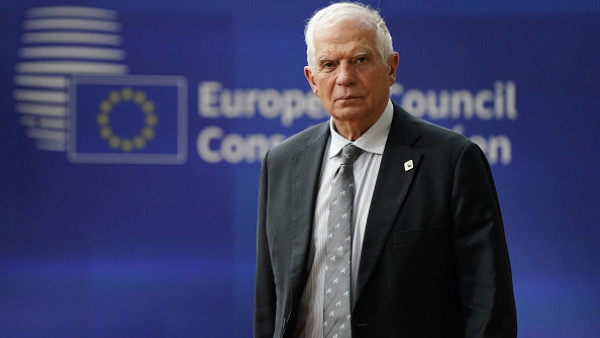Josep Borrell High Representative of the Union for Foreign Affairs and Security Policy arrives to European Council Meeting on June 27, 2024 in Brussels, Belgium. [Getty]
Josep Borrell, the European Union’s High Representative of the Union for Foreign Affairs and Security Policy, is set to be replaced by Estonia’s current Prime Minister Kaja Kallas.
On Friday, the bloc’s 27 national leaders selected Kallas as the EU’s next foreign policy chief after Ursula von der Leyen of Germany was nominated for a second five-year term as president of the European Commission, the EU’s powerful executive body.
EU leaders also selected former Portuguese premier Antonio Costa as the future chair of their European Council meetings.
“Mission accomplished! The European Council has delivered,” the body’s current chair, Charles Michel, told reporters early on Friday morning.
Following her selection, Kallas said in a media conference that her new role is “an enormous responsibility in this time of geopolitical tensions.”
“There’s war in Europe, but there’s also growing instability globally,” she added.
Kallas’s appointment comes as Borrell had gained a reputation during his tenure for his criticism of Israel’s war in the Gaza Strip.
Since 7 October, at least 37,834 Palestinians have been killed and 86,858 wounded by Israel’s military offensive on the besieged enclave, according to Gaza’s health authorities, prompting fierce condemnation by the Spanish diplomat.
Borrell said weeks prior that he formally invited Israel’s top diplomat to a meeting to discuss ties amid the Gaza war.
The EU’s 27 member states agreed to ask Israel’s foreign minister, Israel Katz, to a special gathering under an accord between the two sides that links rights to trade ties.
Borrell said at the time that he wanted to press Israel on the catastrophic situation in Gaza, its respect for human rights, and a ruling by the UN’s top court to stop an offensive in Rafah.
Borrell was seeking support from countries such as Spain, Ireland, and Belgium at the EU-Israel Association Council meeting, which Katz was set to attend.
According to Israel media, the conference will occur after Kallas takes office on July 1.
Ynet News reported that Katz’s diplomatic efforts, such as appealing to Hungary and gaining the backing from Germany, Greece, the Czech Republic, and Austria, led to the event’s postponement.
In March, Katz rebuked Borrell’s stance ahead of an EU summit in Brussels, where he said “it’s time” for the former foreign policy chief to “stop attacking Israel and recognize our right to self-defense against Hamas’s crimes”.
Earlier this month, Borrell once again urged Israel to “end this bloodbath immediately,” advocating for the US-backed ceasefire and hostage deal, which was forwarded by President Joe Biden in late May.
He reiterated that the plan represents the “way forward for an enduring ceasefire and to end the killing”.
Kallas’ takes on Israel
Borrell’s replacement Kallas has appeared to support Israel’s actions since 7 October, while also calling for a two- state solution to instil stability in the region.
The Estonian prime minister denounced Iran’s “unjustified” missile and drone attacks on Israel in April, following Israel’s reported attack on the Iranian consulate in Syria’s capital.
“This is a serious escalation putting more lives at risk,” the politician said in a statement.
In October last year, Kallas backed Israel’s offensive in the Palestinian territory, shortly after the Hamas-led 7 October attacks, arguing that “Israel is engaged in self-defense against terrorism”.
Kallas has also expressed concern about Gaza’s alarming humanitarian crisis, warning that “humanitarian aid has to reach people in Gaza and humanitarian laws have to be followed, which means civilians cannot be targeted”.
UNRWA, the UN agency supporting Palestinian refugees, recently described the “extremely dire” living conditions in the Gaza Strip amid ongoing Israeli bombardments- adding that food insecurity in the territory was having a visible effect on the population.
Kallas, a 47-year-old lawyer, is most known for being one of the most vocal European backers of Ukraine and a fierce critic of Russia within the European Union and NATO.
Commenting on the choice of Kallas for EU foreign policy chief, Kremlin spokesperson Dmitri Peskov accused her of “anti-Russian” rhetoric.
“Mrs Kallas has not demonstrated any diplomatic inclinations so far either, and is well known in our country for her absolutely intransigent and sometimes even openly anti-Russian statements,” he said.
“Therefore, we do not think that European diplomacy will contribute in any way to the normalisation of relations. The prospects, in terms of relations between Moscow and Brussels, are bad.”
Press agencies also contributed to this piece.


